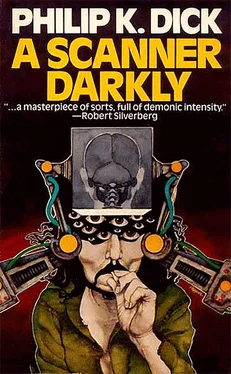“No, that’s not your job!” one of the elderly men said sharply. “I’m supposed to do that.”
“Okay,” he agreed, rising, bumping his head on the edge of the table. He held spilled food in his hand and he gazed at it, wonderingly.
“Go help clear the dining room!” the other older man said to him. He had a slight speech impediment.
One of the kitchen help, someone from the dishpan, said to him in passing, “You need permission to sit with the kids.”
He nodded, standing there, puzzled.
“That’s for the old folk,” the dishpan person said. “Babysitting.” He laughed. “That can’t do nothing else.” He continued by.
One child remained. She studied him, large-eyed, and said to him, “What’s your name?”
He answered nothing.
“I said, what’s your name?”
Reaching cautiously, he touched a bit of beef on the table. It had cooled now. But, aware of the child beside him, he still felt warm; he touched her on the head, briefly.
“My name is Thelma,” the child said. “Did you forget your name?” She patted him. “If you forget your name, you can write it on your hand. Want me to show you how?” She patted him again.
“Won’t it wash off?” he asked her. “If you write it on your hand, the first time you do anything or take a bath it’ll wash off.”
“Oh, I see.” She nodded. “Well, you could write it on the wall, over your head. In your room where you sleep. Up high where it won’t wash off. And then when you want to know your name better you can—”
“Thelma,” he murmured.
“No, that’s my name. You have to have a different name. And that’s a girl’s name.”
“Let’s see,” he said, meditating.
“If I see you again I’ll give you a name,” Thelma said. “I’ll make one up for you. ‘Kay?”
“Don’t you live here?” he said.
“Yes, but my mommy might leave. She’s thinking about taking us, me and my brother, and leaving.”
He nodded. Some of the warmth left him.
All of a sudden, for no reason he could see, the child ran off.
I should work out my own name, anyhow, he decided; it’s my responsibility. He examined his hand and wondered why he was doing that; there was nothing to see. Bruce, he thought; that’s my name. But there ought to be better names than that, he thought. The warmth that remained gradually departed, as had the child.
He felt alone and strange and lost again. And not very happy.
***
One day Mike Westaway managed to get sent out to pick up a load of semirotten produce donated by a local supermarket to New-Path. However, after making sure no staff member had tailed him, he made a phone call and then met Donna Hawthorne at a McDonald’s fast-food stand.
They sat together outside, with Cokes and hamburgers between them on the wooden table.
“Have we really been able to duke him?” Donna asked.
“Yes,” Westaway said. But he thought, The guy’s so burned out. I wonder if it matters. I wonder if we accomplished anything. And yet it had to be like this.
“They’re not paranoid about him.”
“No,” Mike Westaway said.
Donna said, “Are you personally convinced they’re growing the stuff?”
“Not me. It’s not what I believe. It’s them.” Those who pay us, he thought.
“What’s the name mean?”
“ Mors ontologica . Death of the spirit. The identity. The essential nature.”
“Will he be able to act?”
Westaway watched the cars and people passing; he watched moodily as he fooled with his food.
“You really don’t know.”
“Never can know until it happens. A memory. A few charred brain cells flicker on. Like a reflex. React, not act. We can just hope. Remembering what Paul says in the Bible: faith, hope, and giving away your money.” He studied the pretty, dark-haired young girl across from him and could perceive, in her intelligent face, why Bob Arctor—No, he thought; I always have to think of him as Bruce. Otherwise I cop out to knowing too much: things I shouldn’t, couldn’t, know. Why Bruce thought so much of her. Thought when he was capable of thought.
“He was very well drilled,” Donna said, in what seemed to him an extraordinary forlorn voice. And at the same time an expression of sorrow crossed her face, straining and warping its lines. “Such a cost to pay,” she said then, half to herself, and drank from her Coke.
He thought, But there is no other way. To get in there. I can’t get in. That’s established by now; think how long I’ve been trying. They’d only let a burned-out husk like Bruce in. Harmless. He would have to be … the way he is. Or they wouldn’t take the risk. It’s their policy.
“The government asks an awful lot,” Donna said.
“Life asks an awful lot.”
Raising her eyes, she confronted him, darkly angry. “In this case the federal government. Specifically. From you, me. From—” She broke off. “From what was my friend.”
“He’s still your friend.”
Fiercely Donna said, “What’s left of him.”
What’s left of him, Mike Westaway thought, is still searching for you. After its fashion. He too felt sad. But the day was nice, the people and cars cheered him, the air smelled good. And there was the prospect of success; that cheered him the most. They had come this far. They could go the rest of the way.
Donna said, “I think, really, there is nothing more terrible than the sacrifice of someone or something, a living thing, without its ever knowing. If it knew. If it understood and volunteered. But—” She gestured. “He doesn’t know; he never did know. He didn’t volunteer—”
“Sure he did. It was his job.”
“He had no idea, and he hasn’t any idea now, because now he hasn’t any ideas. You know that as well as I do. And he will never again in his life, as long as he lives, have any ideas. Only reflexes. And this didn’t happen accidentally; it was supposed to happen. So we have this … bad karma on us. I feel it on my back. Like a corpse. I’m carrying a corpse—Bob Arctor’s corpse. Even while he’s technically alive.” Her voice had risen; Mike Westaway gestured, and, with visible effort, she calmed herself. People at other wooden tables, enjoying their burgers and shakes, had glanced inquiringly.
After a pause Westaway said, “Well, look at it this way. They can’t interrogate something, someone, who doesn’t have a mind.”
“I’ve got to get back to work,” Donna said. She examined her wristwatch. “I’ll tell them everything seems okay, according to what you told me. In your opinion.”
“Wait for winter,” Westaway said.
“Winter?”
“It’ll take until then. Never mind why, but that’s how it is; it will work in winter or it won’t work at all. We’ll get it then or not at all.” Directly at the solstice, he thought.
“An appropriate time. When everything’s dead and under the snow.”
He laughed. “In California?”
“The winter of the spirit. Mors ontologica . When the spirit is dead.”
“Only asleep,” Westaway said. He rose. “I have to split, too, I have to pick up a load of vegetables.”
Donna gazed at him with sad, mute, afflicted dismay.
“For the kitchen,” Westaway said gently. “Carrots and lettuce. That kind. Donated by McCoy’s Market, for us poor at New-Path. I’m sorry I said that. It wasn’t meant to be a joke. It wasn’t meant to be anything.” He patted her on the shoulder of her leather jacket. And as he did so it came to him that probably Bob Arctor, in better, happier days, had gotten this jacket for her as a gift.
“We have worked together on this a long time,” Donna said in a moderate, steady voice. “I don’t want to be on this much longer. I want it to end. Sometimes at night, when I can’t sleep, I think, shit, we are colder than they are. The adversary.”
Читать дальше








